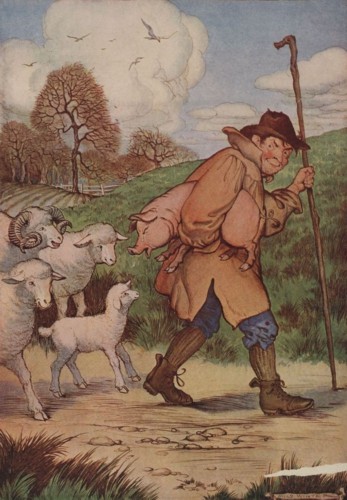PART A_1
Let’s learn vocabulary. Listen and repeat the words and the sentences with your tutor.
PART A_2
| 1. capture | /KAP-cher/ |
| -to take by force or stratagem; take prisoner; seize: | |
| The fat tabby cat captured a mouse in the attic. | |
| 2. struggle | /STRUHG-uhl/ |
| -the process or an act or instance of struggling. | |
| The duckling managed to free itself from the trap after hours of struggles. | |
| 3. frantic | /FRAN-tik/ |
| -desperate or wild with excitement, passion, fear, pain, etc. | |
| The young mother was frantic when she heard her baby was switched at birth. | |
| 4. squeal | /skweel/ |
| -to make a long, very high sound or cry | |
| The children heard the piglets squealing at the barn. | |
| 5. fuss | /fuhs/ |
| -an excessive display of anxious attention or activity; needless or useless bustle | |
| They made a fuss over a trivial offense. |
PART B_1
Let’s read the story. Please read them aloud, and I will check your pronunciation and intonation.
PART B_2
THE SHEEP AND THE PIG

One day a shepherd discovered a fat Pig in the meadow where his Sheep were pastured. He very quickly captured the porker, which squealed at the top of its voice the moment the Shepherd laid his hands on it. You would have thought, to hear the loud squealing, that the Pig was being cruelly hurt. But in spite of its squeals and struggles to escape, the Shepherd tucked his prize under his arm and started off to the butcher’s in the marketplace.
The Sheep in the pasture were much astonished and amused at the Pig’s behavior and followed the Shepherd and his charge to the pasture gate.
“What makes you squeal like that?” asked one of the Sheep. “The Shepherd often catches and carries off one of us. But we should feel very much ashamed to make such a terrible fuss about it like you do.”
“That is all very well”, replied the Pig, with a squeal and a frantic kick. “When he catches you he is only after your wool. But he wants my bacon! gree-ee-ee!”
It is easy to be brave when there is no danger.
PART C_1
Let’s answer comprehension questions. Please answer them based on the story.
PART C_2
| 1. | What did the Shepherd find in the meadow aside from his sheep? |
| 2. | Where did he bring the Pig? |
| 3. | What did the Pig and the Sheep talk about? |
PART D_1
Let’s discuss the story. Please answer the questions below and express your opinions.
PART D_2
| 1. | Would you consider the Sheep brave? Why or why not? |
| 2. | Would you consider the Pig brave? Why or why not? |
| 3. | If you were the Sheep, what you do think about after hearing its last reply? |
| 4. | The fable’s lesson is “It is easy to be brave when there is no danger.” Do you agree with this? Why or why not? |
| 5. | Who is the bravest person you know? Please tell me more about him/her. |
REVIEW AND FEEDBACK
Now, let us review the things that you learned in this lesson.
ではこのレッスンで学んだことを振り返りましょう。
(Please give a short feedback on how your student did on your class.)
| Grammar 文法 |
Pronunciation 発音 | Vocabulary 単語 |
Comprehension 理解 |
|
|---|---|---|---|---|
 GOOD GOOD |
文法の誤りはほとんどなく、完全な文章で話すことができる | ほとんどの単語をはっきりと正しく発音することができる | 習った表現を適切に使うことができる | 文章を理解し、質問に正しく答えることができる |
 FAIR |
文法の誤りはあるが、完全な文章で話すことができる | 発音の練習が必要な言葉がいくつかある | たまにミスはあるが、習った表現を適切に使うことができる | 文章を完全に理解するのは難しく、質問に正しく答えられないときもある |
 POOR |
文章で話すのは難しく、単語だけで話すことができる | 発音の練習が必要である | 習った単語と表現を少しだけ使うことができる | 文章を理解するのは難しく、質問に答えるのは難しい |
Parts of this lesson material are based on:
An eBook from The Project Gutenberg.
This eBook is for the use of anyone anywhere at no cost and with almost no restrictions whatsoever. You may copy it, give it away or re-use it under the terms of the Project Gutenberg License included with this eBook or online at www.gutenberg.org
An eBook from The Project Gutenberg.
This eBook is for the use of anyone anywhere at no cost and with almost no restrictions whatsoever. You may copy it, give it away or re-use it under the terms of the Project Gutenberg License included with this eBook or online at www.gutenberg.org